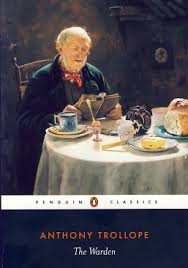 I was inspired by Stanley Hauerwas to read some Trollope, and this was my first. An easy to read mid-nineteenth century novel (1855), in which the author intrudes into the narrative at a number of places. It is a gentle story of a good and honest clergyman hounded by the press for what they consider to be a moral compromise and an abuse of position. Harding, caretaker of a hostel with twelve elderly men in care, is accused of illegitimately taking the money which should by rights belong to the twelve men in the home. The introductory essay situates the narrative in real events unfolding in England at the time. It highlights the growing power and amoral posture of the newspapers, and details the response of Rev. Harding to the pressure he experiences.
I was inspired by Stanley Hauerwas to read some Trollope, and this was my first. An easy to read mid-nineteenth century novel (1855), in which the author intrudes into the narrative at a number of places. It is a gentle story of a good and honest clergyman hounded by the press for what they consider to be a moral compromise and an abuse of position. Harding, caretaker of a hostel with twelve elderly men in care, is accused of illegitimately taking the money which should by rights belong to the twelve men in the home. The introductory essay situates the narrative in real events unfolding in England at the time. It highlights the growing power and amoral posture of the newspapers, and details the response of Rev. Harding to the pressure he experiences.
Hauerwas appreciates Trollope because he develops and portrays the character of Harding, the depth of his honour, his wrestling with moral ambiguity, his decision to choose the highest and the best rather than simply settle for what was permissible or good, even at great cost to himself and his daughter. For Hauerwas, Trollope’s stories illustrate the narrative context and formation of virtue, that is, that virtue is formed in the concrete experience of life and community.
In one scene, the moral activist Mr John Bold who launches the action against Mr Harding, is appealed to by Mr Harding’s elder daughter to drop his case:
‘Pray, pray, for my sake, John, give it up. You know how dearly you love her’ [Harding’s younger daughter]. And she came and knelt before him on the rug. ‘Pray, give it up. You are going to make yourself, and her, and her father miserable: you are going to make us all miserable. And for what? For a dream of justice. You will never make those twelve men happier than they now are’ (50).
 In this instance, Trollope shows that justice can never be simply the application of an abstract principle, but must be concerned with actual situations and actual people, otherwise it is “a dream of justice” and not actual justice.
In this instance, Trollope shows that justice can never be simply the application of an abstract principle, but must be concerned with actual situations and actual people, otherwise it is “a dream of justice” and not actual justice.
We see something of Trollope’s humour, as well as his understanding of morality, in the following description of “Dr Pessimist Anticant” – an allegorical reference to Thomas Carlyle, a Scottish essayist and historian:
[He] had passed a great portion of his early days in Germany; he had studied there with much effect, and had learnt to look with German subtlety into the root of things, and to examine for himself their intrinsic worth and worthlessness. No man ever resolved more bravely than he to accept as good nothing that was evil; to banish from him as evil nothing that was good. ‘Tis a pity that he should not have recognized the fact that in this world no good is unalloyed, and that there is but little evil that has not in it some seed of what is goodly.
Returning from Germany, he had astonished the reading public by the vigour of his thoughts, put forth in the quaintest language. He cannot write English, said the critics. No matter, said the public: we can read what he does write, and that without yawning. And so Dr Pessimist Anticant became popular. Popularity spoilt him for all further real use, as it has done many another…
Hauerwas is so good at reading literature theologically. Good on you for tackling Trollope, someone I’ve never read. But recently, Nigel Starck’s book on Trollope in Australia came out, The First Celebrity [ie to visit Australia]; there was an interesting interview on RN – http://www.abc.net.au/radionational/programs/booksandartsdaily/anthony-trollope27s-australian-odyssey/5763240
Thanks for the link Nathan – that was an interesting interview. How parochial can Australians be!